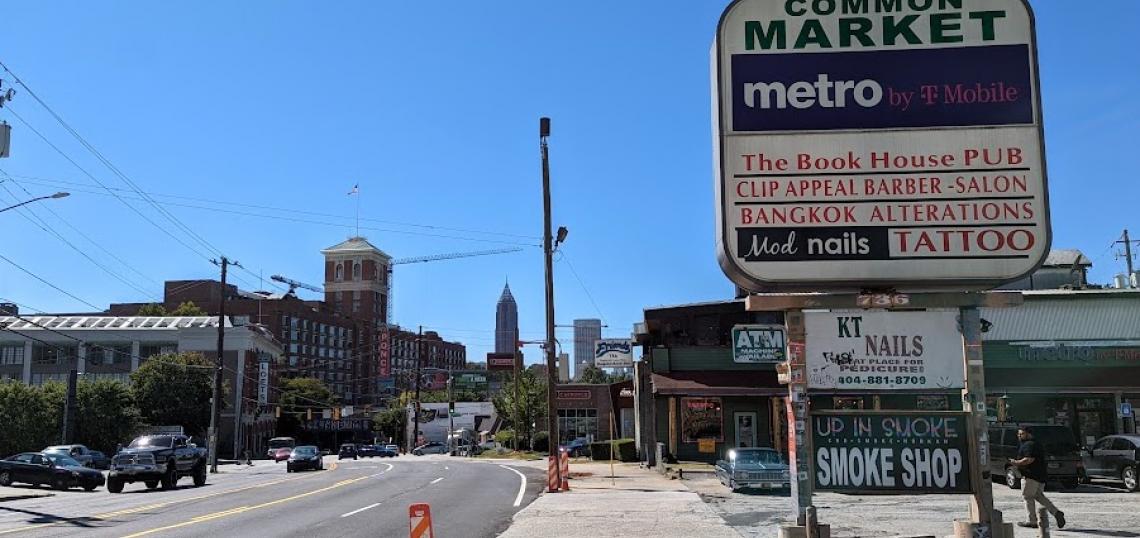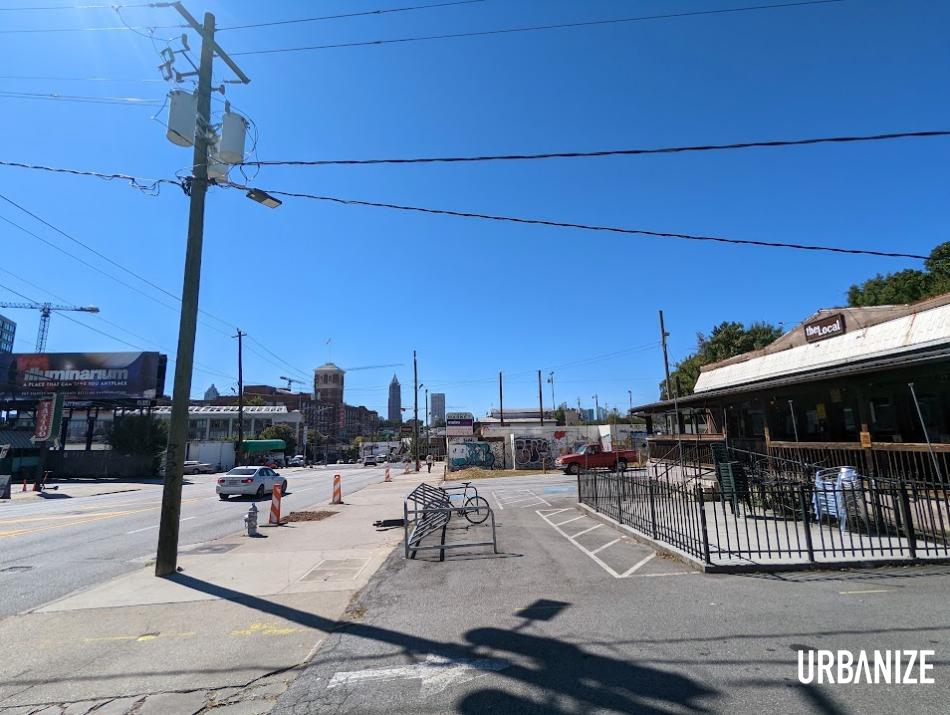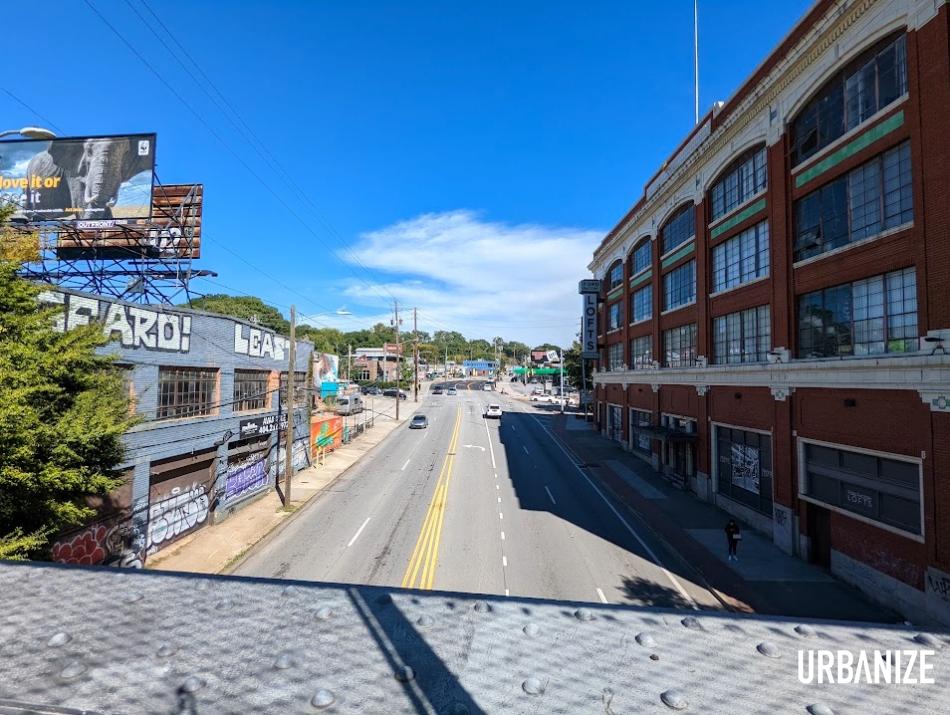Back in June, rumors that a high-powered development firm was assembling blocks of Ponce de Leon Avenue to wipe out longstanding bars, restaurants, and nightlife institutions sent shockwaves through Atlanta.
Would Ponce stalwarts like MJQ Concourse, Friends on Ponce, The Local, and Book House Pub be going the way of The Masquerade’s original location, LGBTQ dive bar Model T, and more recently in Midtown, The Highlander, Joe’s On Juniper, and Einstein’s? Would a corporate takeover proliferate on lovably scruffy Ponce? And if so, when?
The rumors turned out to be true—at least to a degree.
The developer in question, Portman Holdings, is as high-profile and deeply rooted in Atlanta as they come. They have indeed engaged in talks—and now signed paperwork—with landowners along the north side of Ponce, stretching across properties from the BeltLine’s Eastside Trail to the VESTA Movement gym at 744 Ponce de Leon Avenue NE, stopping before the building that’s currently home to gusto! restaurant.
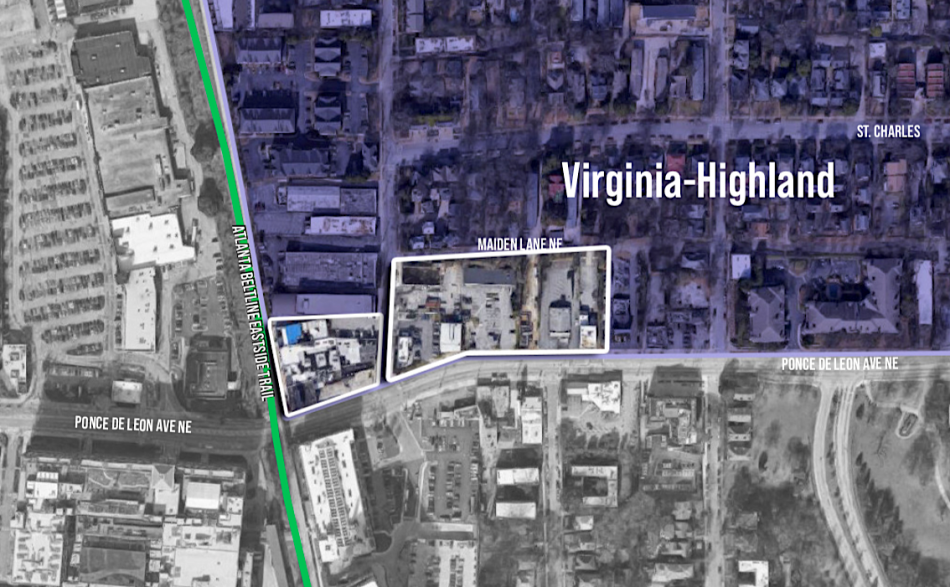 The scope of Ponce properties where Portman currently has letters of intent signed with landowners wishing to sell, per the developer. Courtesy of Portman Holdings
The scope of Ponce properties where Portman currently has letters of intent signed with landowners wishing to sell, per the developer. Courtesy of Portman Holdings
But if any redevelopment of those parcels will materialize—if anything will change soon at all, in fact—remains to be seen, per the developer.
During a recent Q&A with Urbanize Atlanta, Ambrish Baisiwala, Portman Holdings’ chairman and CEO, shed light on the background of the potential Ponce deals and spoke candidly about his logic regarding how the company will proceed. An East Cobb expat and consistent BeltLine patron, Baisiwala now lives in Morningside. The pushback to Ponce changes, he says, is understandable, but he feels the time could be right for change. His answers have been lightly edited below for clarity and length.
…
Urbanize Atlanta: This is obviously a big deal, in a lot of ways. Do you have visuals yet for what you might build?
Ambrish Baisiwala: We don’t really have any renderings—this is just about a conversation that’s happening. I know the story started to come out about somebody was assembling the parcels and all that. The way we are approaching it, and we’re very mindful about this, is that we want to have a dialogue with the neighborhood and make sure we’re all on the same page before we start putting plans to it. At this point in time, it’s really a matter of, “Okay, what’s the guidelines, what’s the height [restrictions], what’s the setbacks, what’s the right box to be doing over here?” We haven’t gone beyond that at all.
So there’s no big reveal at this time?
We’ve been talking to all the individual landowners, in the process of really putting together this site. And if we go ahead and do something, the program would be a very activated ground floor with retail. So obviously a much better street experience and much better connectivity to the BeltLine [than current conditions]. I know some of the existing [businesses] on site right now want to come back—obviously we’ll have the discussion and open that up. And then we’ll look at some combination of offices and apartments. So that’s the basic program.
By the way, I—and a lot of our team members—live in the neighborhood. If the neighborhood comes back and says, “No, this is not what we want all,” we can always change direction and back off.
So this is not a 100-percent done deal, as you see it?
No. I want to make sure, from my point of view, that the neighborhood sees it as something agreeable to them. There is a sense in the way the media is reporting it that we are somehow going out and forcibly putting these land parcels under control. That’s really not the truth. Basically what we’re finding as we’re going out there is that there are different [landowners] … kind of looking at this as a way to make an exit, as one example, and retire. The businesses which are the tenants really are saying we’ve been there a long time, we’ve had a good run, and it’s probably a good time to end it. So it’s not that we went out there and somehow forced people into doing a transaction.
Somebody approached us on a piece of land, and we said, “Yes, it’s very interesting, but we cannot make it work unless we have a bigger piece of land.” So we had conversations with adjoining owners, and they all expressed interest in doing something with it. That’s how the whole thing came about.
The scope of the properties in question contiguously together is maybe a half-dozen properties, beginning to the east with what’s currently a gym?
It’s the Paris on Ponce piece of land, where the restaurant used to be right next to it, to the west adjacent to the BeltLine. To the east, it’s basically Ponce de Leon Place, which backs up to a residential street, Maiden Lane, and it goes past the site where The Local is.
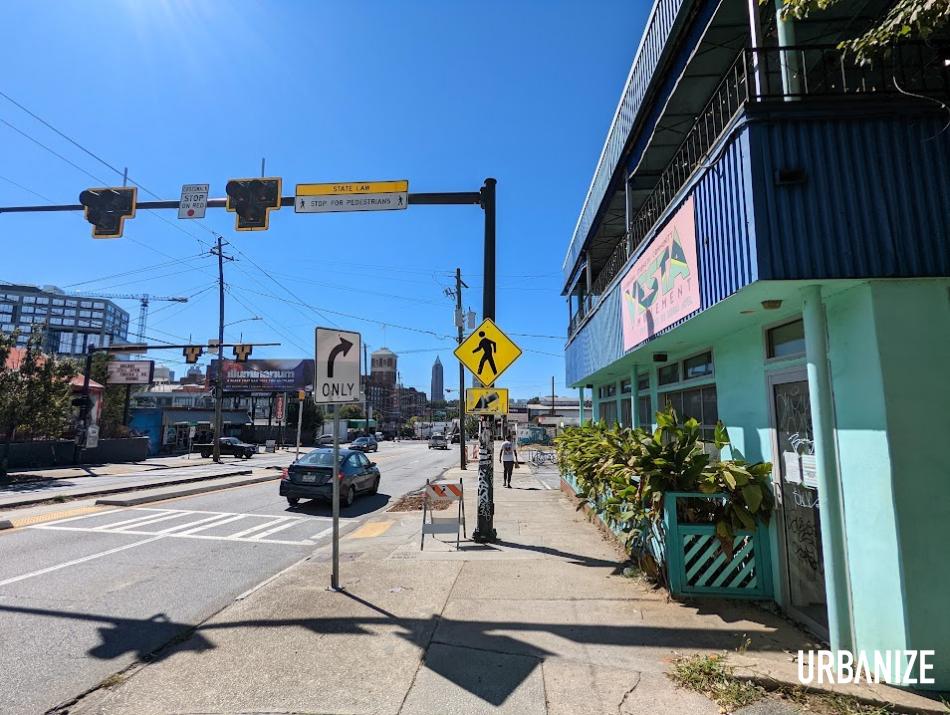 Portman's Ponce redevelopment would begin here, in the 700 block of Ponce, and continue on this side of the street to the BeltLine. Josh Green/Urbanize Atlanta
Portman's Ponce redevelopment would begin here, in the 700 block of Ponce, and continue on this side of the street to the BeltLine. Josh Green/Urbanize Atlanta
Is Portman Holdings under contract on these properties?
It’s not under contract—it’s under LOI [letter of intent]. With multiple different landowners.
For Portman Holdings, has this area been on the radar for a while, or did it just come out of the sky for you?
We did not target them. We’re actively looking on the BeltLine, like everybody else in Atlanta. We don’t really want to get out there and do one residential [project] or one little office building and move on. We’re trying to do a lot of placemaking and create a destination. That destination may mean one building with a couple of very nice, ground-floor restaurants—as little as that, or more grand.
What we like about this opportunity is, this is a part of town that’s obviously attractive with everything going on around it. It has an opportunity and a need for a better condition. There’s really no connection to the BeltLine besides a little alley next to a self-storage space. And you have all of these broken sidewalks that are really much narrower than they out to be.
So what we’re looking at doing is creating an office product next to the BeltLine and then a really nice, property connection through that office building to the BeltLine, and create a nice retail destination. I think the sidewalks are now four or five feet [wide] and very chopped up. We’d put in 20-foot-wide sidewalks, very nicely landscaped, and then create a lot of [food and beverage] outlets that kind of spill out onto that. And try to activate it with destinations that are family-friendly, where people can go with kids. Not just the late-night bar scene, but really a scene that works throughout the day. And then a nice residential product above that.
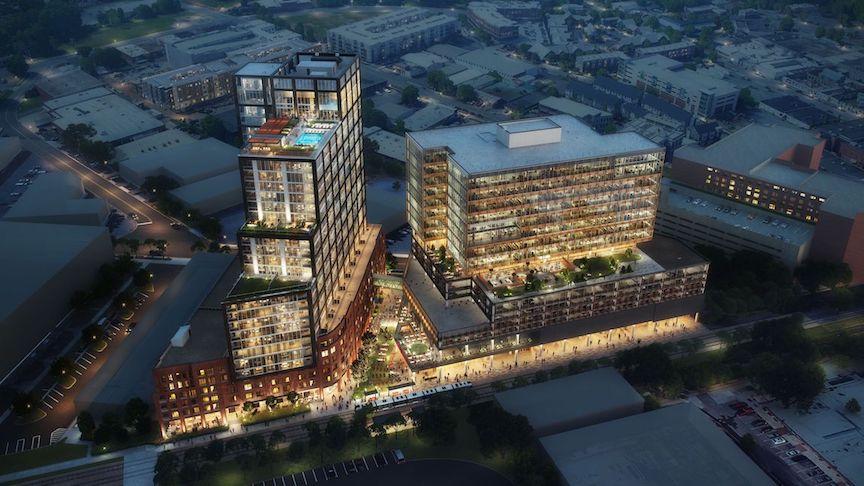 Portman’s The Line project in Charlotte will feature 285,000 square feet of offices and 28,382 square feet of retail, anchored by Sycamore Brewery and Taproom and located on the Charlotte Rail Trail. It could lend a preview of the type of programming bound for Ponce. Courtesy of Portman Holdings
Portman’s The Line project in Charlotte will feature 285,000 square feet of offices and 28,382 square feet of retail, anchored by Sycamore Brewery and Taproom and located on the Charlotte Rail Trail. It could lend a preview of the type of programming bound for Ponce. Courtesy of Portman Holdings
Some of these businesses are obviously cherished by thousands of Atlantans. There’s the argument that too much of Atlanta’s quirky, gritty, or just unique offerings like this are going away for major development. What would you want to say to those people?
I obviously understand that sentiment. From our point of view, it’s not that we set out to find a way to somehow forcibly close on these sites or close the businesses down. The messages that we’re getting are the owners of those land parcels want to sell the land, and in a lot of cases, the tenants who are operating over there are saying it’s time to call it a day, it’s been a good run, but we want to retire.
So irrespective of whether we had gone and assembled all of this or not, I think a lot of those businesses would have moved on. The ones that don’t want to, who want to stay in that location, we are very, very open to having a conversation to say, “Look, we’ll have retail space, and if you want to come back, we’ll happily engage in a dialogue to make that happen.”
That’s often part of the plans, but it doesn’t seem like that usually comes to fruition. That idea is floated out at the beginning of a development process, but the beloved thing that was there before rarely seems to come back in. Is there a way to modify rents for legacy businesses to help ensure that would happen?
The way I would look at it is, you know, is there a way that we can strike a deal which would enable the businesses to come back that’s not rent, but a combination of what they’re doing: the rent, the [tenant improvements], it’s what money the business owner might be putting into it. Absolutely there’s a combination of factors that we could look at. And if somebody said, “Yeah, we want to be back over here,” we would have that discussion with them to enable that to happen.
So what’s the next step for you?
We’re going to take it pretty slow and steady. The next step is to engage with the neighborhood, to present to them… and see if this is a direction the neighborhood is happy about and wants us to keep going.
My sense of all the dialogue that’s been going on around this is that a lot of the people who want all of [the businesses] preserved are not from the neighborhood, and in many cases, they’re not even from Atlanta. But they come to Atlanta, and they like these venues. We’ve seen several posts where people say Portman is coming in and taking away affordable housing; there is no housing on the site—forget about affordable housing. So I don’t know informed that pushback is, in a way.
A lot of us live in the neighborhood, and a lot of the chatter I hear around it is that a lot of people are saying that something needs to be done over here that’s better for the neighborhood. The sense we’re getting is that the neighborhood itself is ready to move on, but a lot of the patrons who come over there are concerned about the businesses.
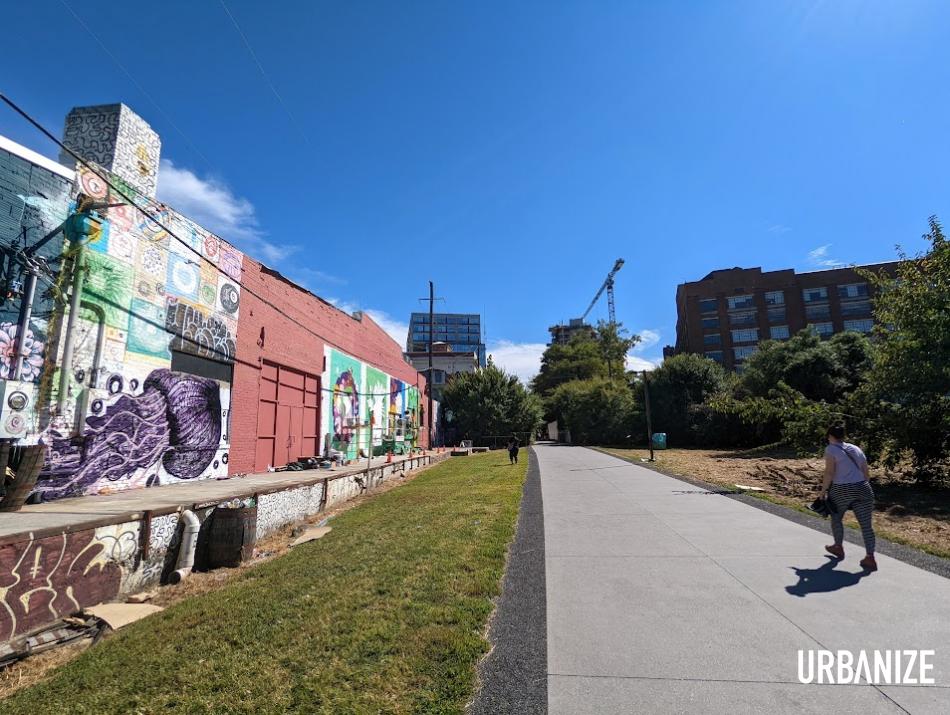 The former Paris on Ponce building in relation to PCM and recent high-rise development on the BeltLine. Josh Green/Urbanize Atlanta
The former Paris on Ponce building in relation to PCM and recent high-rise development on the BeltLine. Josh Green/Urbanize Atlanta
You’re not on agendas for neighborhood board meetings or anything else at this point?
No. The intent is to present to the neighborhood, see how they feel about it, not get ahead of them. If they have concerns, we’ll regroup and reassess. And if the neighborhood wants to keep it as is, we’ll take that very seriously.
Obviously with that particular area of the BeltLine, the character is changing to more of a high-rise, denser use. Is there a certain amount of density you would aim for? A certain height? Or would it be limited?
The whole site would have to be rezoned. When you have a single-family, residential neighborhood, there’s a pretty well-defined and rigid height setback and height plane. So that height plan basically moves from Maiden Lane over the overall site we’re looking at.
If we look to put height there, that would generally be on the Paris on Ponce side of it, on the BeltLine, but not toward the neighborhood. And we would not be looking to breach, in some significant way, what’s already on the BeltLine around there, including with the 725 [Ponce building, with Kroger at its base]. So we don’t have specific plans, but we’re not looking at putting a supertall tower over there, or to go crazy with density.
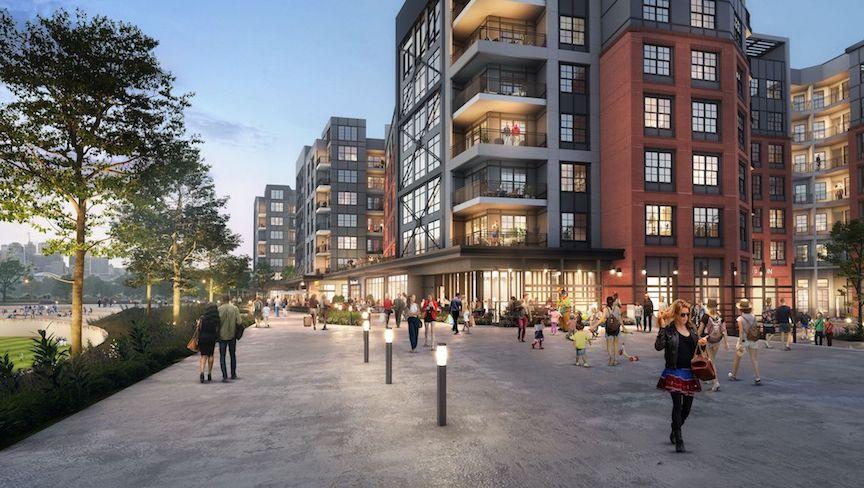 Portman’s Ballpark Village in Nashville’s Germantown neighborhood is an example of mixed-use development the company favors. Courtesy of Portman Holdings
Portman’s Ballpark Village in Nashville’s Germantown neighborhood is an example of mixed-use development the company favors. Courtesy of Portman Holdings
As a resident of the area, have you enjoyed patronizing any of the businesses we’re talking about?
[Laughs] I’m embarrassed to admit I have not been to any of the venues. When I was talking to my friends and colleagues about this, they said, “You know, you’re really too old for this.”
So you haven’t raged at MJQ?
I have not raged at MJQ. They’ve been teasing me they’re going to drag me out there one night, except that it doesn’t open before 11 p.m. They said I’d probably walk in there, and most people would say, “Dad, get out of here,” and I’d walk right out.
The narrative has been that a developer is bullying its way into one of the most cherished streets in town. I’m hearing that’s not the case.
No. The reality is you cannot force someone to sell something to you—they have to have a desire to do it. Portman’s approach is to do fewer but larger, very high-quality developments. We’re generally saying no to more stuff than we’re saying yes to, which is a way of saying there’s always options and choices. We like this part of town—we like it very much.
Is it too early to say what you might be able to invest into building something on Ponce?
I think it is, because we don’t really know how the neighborhood will react, and what they’ll want. That will dictate the size of what we can create over there. For a lot of these [landowners], they made a significant investment; it’s a significant part of their net worth, and they’re looking to maximize the value for it. Ultimately, if the neighborhood wants a density that’s so low that it doesn’t justify the land price, then nothing will happen, and it will remain as it is.
Is it safe to say that businesses Atlantans enjoy patronizing that are there now will be there for at least the next year or so?
Yes. I would say they would be there for at least a year.
Say everything goes well, and you’re able to come to an agreed point with the neighborhood, and rezoning goes relatively smoothly with the city, when would you foresee yourself breaking ground on Ponce?
For us, generally a rule of thumb is that whatever time it takes for us to get through the rezoning, it would likely be about 16 to 18 months after that to break ground.
And then at least two years for construction?
Yes, about two years. Depending on what it is.
• Virginia-Highland news, discussion (Urbanize Atlanta)




